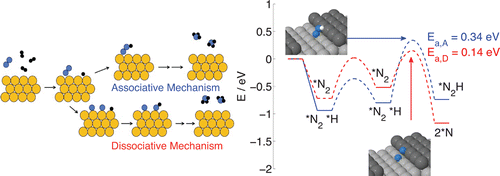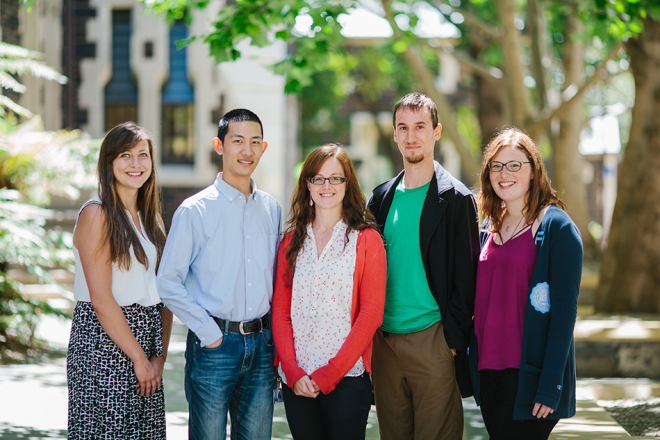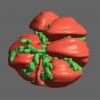Modelling heterogeneous catalysis
Dr Anna Garden and her research group are based in the Department of Chemistry at the University of Otago. Anna leads a highly successful group of young researchers whose research requires use of large scale computational resources, making access to NeSI’s national services very useful. NeSI’s Solutions and Applications team has been supporting Anna and her group throughout the research process.
Anna’s research interests are specifically in heterogeneous catalysis, which is a process of catalysis where the catalyst is in one phase (typically a metal surface or nanoparticle) and the reactants and products are in another phase (typically gas/liquid). Anna’s group takes a computational approach to these processes, in which they are modelled to gain a unique, microscopic view of the reaction mechanism to find out, for example, what steps of the reaction are the most difficult and what types of catalysts can be found to make these steps easier and speed up the overall reaction.
As Anna explains:
“One famous example on which I work is ammonia synthesis, in which ammonia (used for fertiliser) is formed by gaseous nitrogen and hydrogen reaction on a metal catalyst surface. This is what is used in the Haber-Bosch process, which produces 140 million tonnes of ammonia per year. HB process has been studied a lot experimentally but the high temp, high pressure conditions of the HB process mean that information that can be gained experimentally is limited. By simulating the reaction, however, precise information can be gained at any temp/pressure. We have recently used this approach to study different mechanisms of ammonia formation on different structures of catalysts and find that, on nanoparticle catalysts, the mechanism could be quite different than previously thought, throwing the door wide open to optimise the process further.”

The outcomes of this research have been reported in several publications and the internationally recognised work done with a number of collaborators will now flow outwards from the Dunedin campus. Most members of Anna’s team hold majors in at least one other discipline apart from Chemistry, which allows them to expand and build their expertise. In order to progress with their research they needed to develop their computational skills and become fluent in High Performance Computing tools and environment. They focused on this task with the dedicated NeSI support.
Knowledge transfer through NeSI support
NeSI’s Solutions and Applications team has been supporting Dr Anna Garden and her team in a number of aspects of their computational work. As Anna reports:
“Our main software was already installed on NeSI when we began using it, and the support team were able to quickly customise a version for our specific needs, which is built with state-of-the-art optimisers and libraries, useful for surface science.”
The close collaboration between NeSI staff and the Computational Chemistry group at Otago brought a lot of benefits in terms of development of transferable computational skills. It was particularly important in the case of incoming postgraduate students.
“Support to the junior students is really useful, both with my group, who have some Unix experience and with my experimental collaborators, whose students are arriving at NeSI having never worked in a Unix environment before. With my group, NeSI’s support team has offered more technical support, such as helping to optimise memory usage of large jobs. With the experimental students they have offered quick and friendly help with getting started in an HPC environment.”
Sharing the expertise
The successful utilisation of NeSI infrastructure for her research made Dr Anna Garden a local expert fully capable of helping out experimental chemists at the University of Otago:
“I also perform support calculations for experimental colleagues on problems ranging from designing optimal prodrugs for chemotherapy to understanding unexpected supramolecular structures.”
The outcomes of this collaborative work have recently been published (Y. Abghoui, A. L. Garden, J. G. Howalt, T. Vegge, E. Skúlason, "Electroreduction of N2 to ammonia at ambient conditions on mononitrides of Zr, Nb, Cr and V: A DFT guide for experiments", ACS Catal., 6, 635-646 (2016)).
$300,000 for Fast-Start
The importance and high profile of Anna’s research has been widely recognised, and she was recently awarded a Marsden-funded Fast-Start grant of $300,000. This grant will allow Dr Garden to focus on finding solutions to help mitigate the growing pollution of New Zealand’s waterways with nitrate, an issue which arises mainly due to agricultural intensification and overuse of fertilisers. The grant will allow Anna to expand her international collaboration, working further with Professor Egill Skúlason from the University of Iceland with whom she has already published a number of high-impact papers.
NeSI is thrilled to support research which not only makes significant contributions to the field of computational chemistry, but also provides solutions for tackling New Zealand’s environmental challenges.







